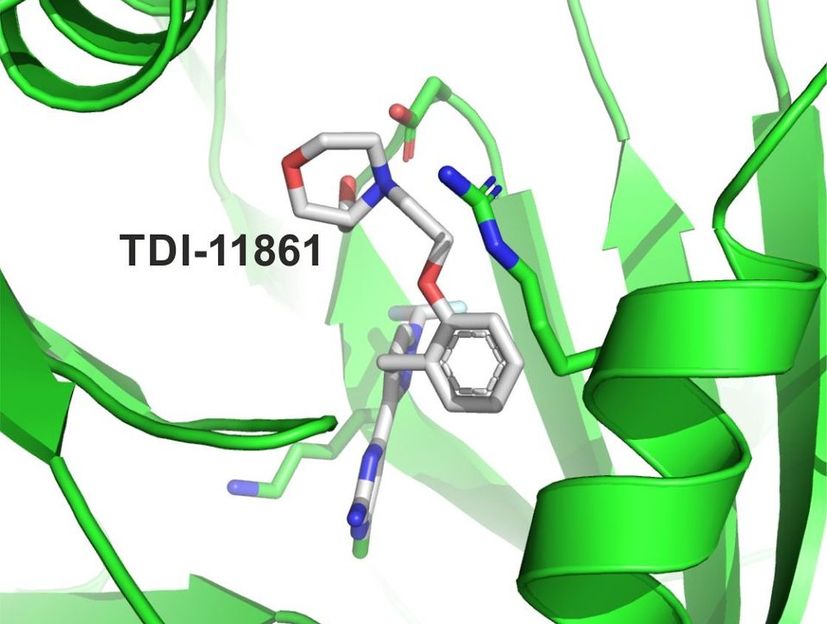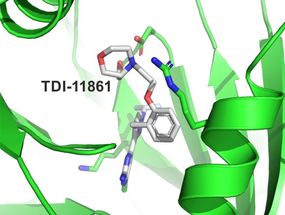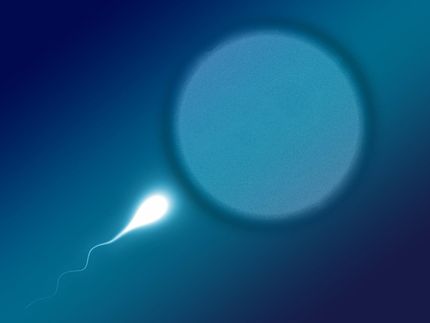New study on the male contraceptive pill
Researchers launch contraceptive startup
Advertisement
A new preclinical study is paving the way for the development of a “man’s contraceptive pill” that can be taken by men before sexual intercourse to prevent pregnancy. In animal experiments, U.S. researchers have successfully tested a biochemical mechanism that renders the sperm of the male partner temporarily infertile. One of the co-authors of this study, Bayreuth biochemist Prof. Dr. Clemens Steegborn, played a significant role in previous studies that identified the drug targeting this mechanism.

Symbolic image
Computer-generated image

The active ingredient TDI-11861 (grey) binds into a pocket of the sAC enzyme (green) and blocks its active site.
© Clemens Steegborn


Key biochemical preliminary studies on sAC inhibitors
Steegborn's research team at the University of Bayreuth has been studying soluble adenylyl cyclase (sAC) from a biochemical perspective for many years. In numerous physiological processes, this enzyme produces cAMP (cyclic adenosine monophosphate), an essential messenger for signal transmission in mammals. cAMP is also required for signal transmission associated with reproductive processes. As a result, activation of sAC, which synthesizes this messenger, is a crucial prerequisite for sperm motility and maturation, and thus for their ability to reach the membrane of the female egg. Therefore, sperm fertility depends on active sAC enzyme.
In November 2022, Steegborn along with researchers in the United States who were leading the new preclinical study, published a joint study on sAC inhibitors. These are agents that significantly reduce or completely inhibit sAC activity. For investigating the biochemical requirements of a non-hormonal contraceptive for men, known sAC inhibitors were analysed to determine how well they suppress sperm fertility on demand. A close transatlantic collaboration indeed succeeded in identifying a sAC inhibitor with particularly advantageous properties for this purpose: the inhibitor TDI-11861. It turns out that this compound is even better suited for developing a non-hormonal contraceptive than the inhibitor TDI-10229. The latter is a sAC inhibitor that had been suggested by Steegborn and the U.S. research team as a possible drug for such a contraceptive in a previous paper they published in July 2021.
Successful preclinical trials
The research published in recent years now forms the basis for the new preclinical study: At the Faculty of Medicine of Cornell University (Weill Cornell Medicine) the mode of action of sAC inhibitors was tested in male mice. The series of experiments confirmed the strong contraceptive efficacy. TDI-11861 can suppress sperm fertility even more effectively than TDI-10229. For two-and-a-half hours following a single injection of TDI-11861, the contraceptive effect is 100 percent. Three hours after the injection, some sperm begin to become motile again. Nevertheless, the contraceptive effect three-and-a-half hours after the injection is still 91 percent. Normal sperm fertility is restored 24 hours after injection. Another important aspect: the male mice did not show any health problems during the six weeks they were given sAC inhibitors.
The next steps in development and a new start-up in the US
The researchers in New York City will now continue their preclinical experiments in a second animal model. At the same time, they are working on improving certain details of TDI-11861 and producing optimized derivatives of this compound. If the next experiments are also successful and confirm the findings obtained so far, the prerequisites would be in place for the first clinical trials in which the effect of the sAC inhibitors on the motility of sperm from healthy human males would be tested. For efficiently pushing forward the development of a contraceptive, Steegborn and five US researchers founded a start-up called "Sacyl Pharmaceuticals" based in the New York City metropolitan area in August 2022.
Research contributions from Bayreuth for an urgently needed contraceptive
“To date, only condoms or a surgical procedure for sterilization – the vasectomy – are available to men as effective methods of contraception. Hormone-free contraceptives are therefore urgently needed and in high demand. Our new preclinical study represents a milestone for the development of a hormone-free contraceptive, which also has the advantage that it can be taken in tablet form, only when needed and at short notice. Over the years, our lab in Bayreuth has been able to make some important contributions to understanding the biochemical basis of the relevant processes,” says Prof. Dr. Clemens Steegborn. He adds: “The starting point of our research at the University of Bayreuth was the question of how the synthesis of the messenger substance cAMP – which is central to signal transmission in all mammals – can be influenced by regulation of the soluble adenylyl cyclase sAC and what pharmaceutical opportunities might result from this. We will continue these investigations and are exploring possibilities for disease prevention and treatment, for example by targeting eye pressure or insulin release.”
Original publication
Melanie Balbach et al.: On-demand male contraception via acute inhibition of soluble adenylyl cyclase. Nature Communications (14 February 2023)
Other news from the department science
Most read news
More news from our other portals
Something is happening in the life science industry ...
This is what true pioneering spirit looks like: Plenty of innovative start-ups are bringing fresh ideas, lifeblood and entrepreneurial spirit to change tomorrow's world for the better. Immerse yourself in the world of these young companies and take the opportunity to get in touch with the founders.


























































